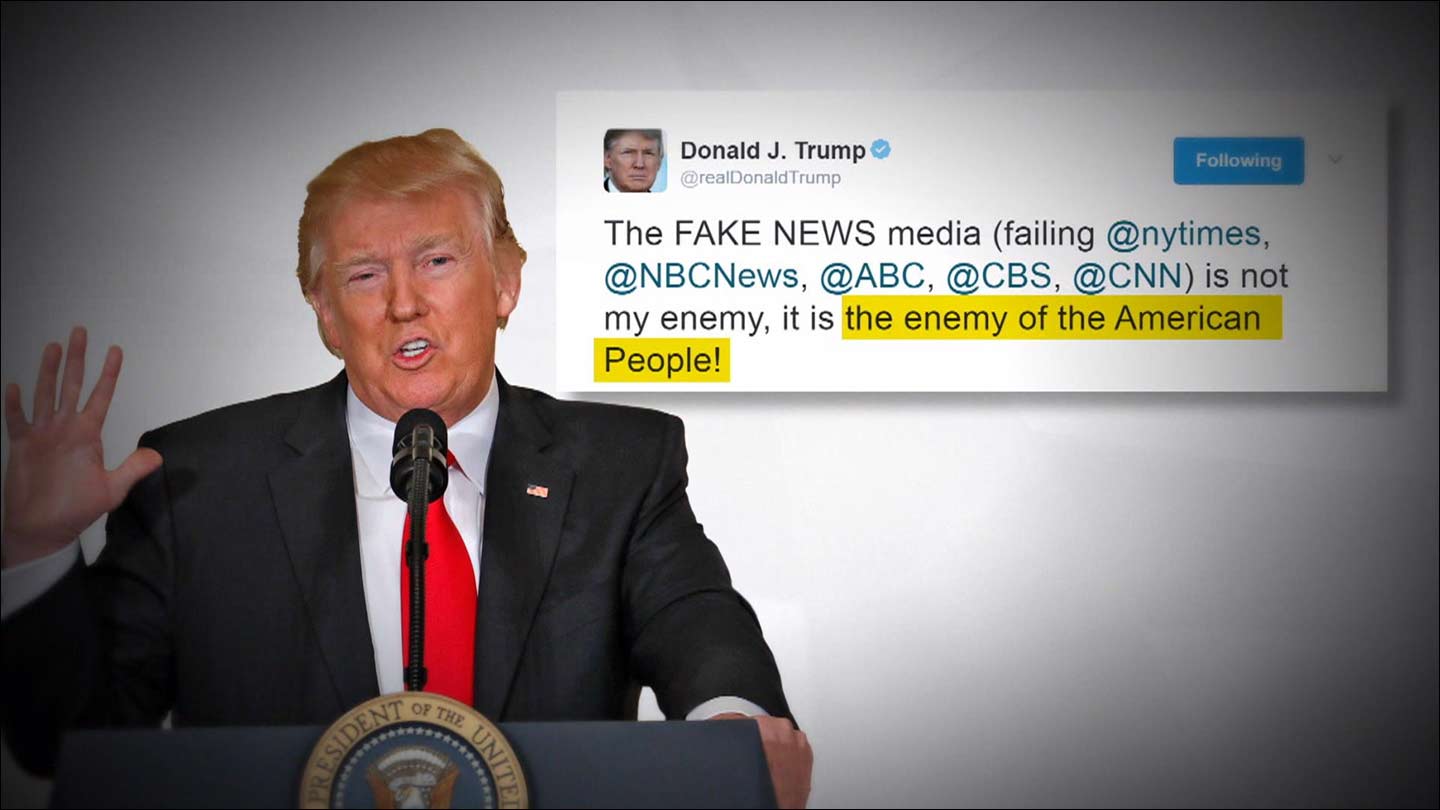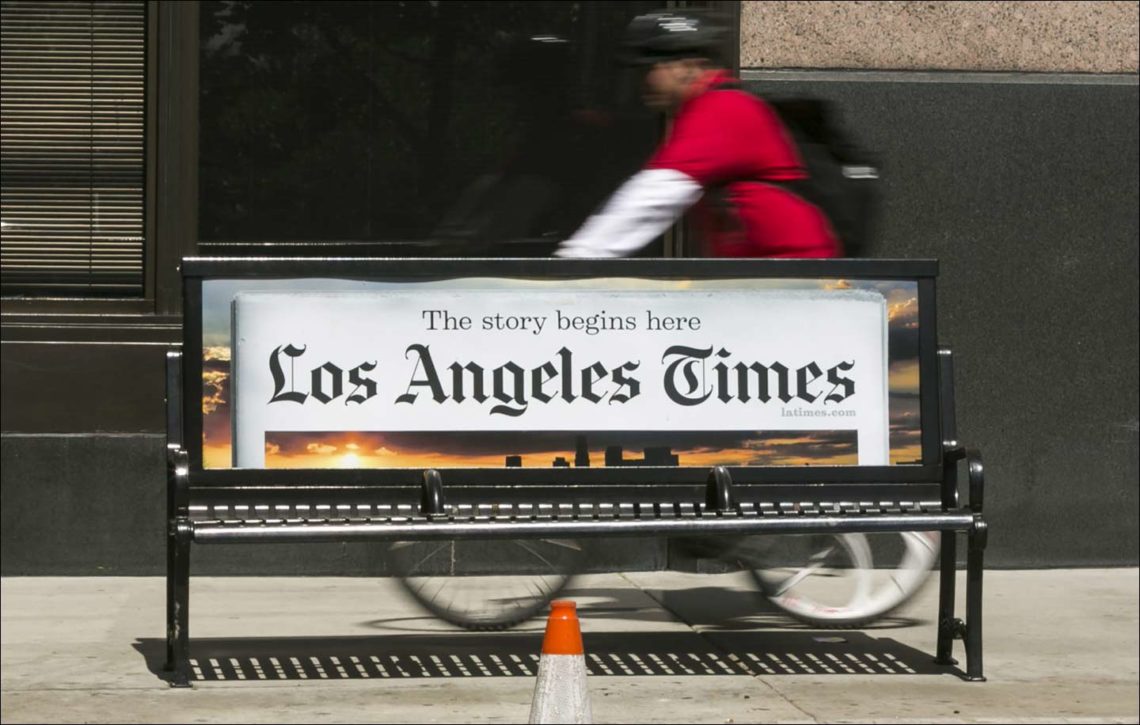“Fake news is cheap to produce. Genuine journalism is expensive.”
Toomas Hendrik
“In America the President reigns for four years, and Journalism governs forever and ever.”
Oscar Wilde
March 12, 2019
Dear Journalists of the Present and the Future,
Before I talk about the role of your chosen vocation — “journalism” — in America today, a bit of autobiography, please.
I read the Los Angeles Times in print everyday for some twenty five years. I had the newspaper delivered to my residence and I read page and after page of print, the black ink smudging my fingers. It was a huge part of my civic formation and shaped how my mind worked. I spent thousands of hours cogitating on what I read in the most important newspaper of the region, southern California, where I grew up and lived in as a young adult. I would hope that my payments over decades to the LA Times helped to pay for the livelihoods of the journalists and other employees who worked there.
Then the financial crisis of 2008 hit, and The Los Angeles Times also seemed to take a hit. Craigslist and other online sellers had hit the advertising budgets of newspapers hard: why pay cold cash to take out an ad in a print newspaper when you could do so online for free? And why pay to have a print newspaper delivered in to your doorstep each morning when you could read it online for free? The old business model in journalism had broken down, and there was no new one to replace it. A decade later, there still isn’t one.
This trend had been ongoing for some time, but in 2008 it seemed to hit home for real. I saw The Los Angeles Times shrink in its size, as journalists were laid off and news reporting and analysis shrunk. The time it took me to read the paper was much less; I could see clearly that the product was shrinking. The daily newspaper was lighter and thinner. The paper was starving — for lack of money. Good journalism costs money, and The LA Times just seemed to have much less of it. The Ventura County Star shrunk even more: I could read that newspaper in about ninety seconds, checking briefly to see if any murders had taken place in town. Local news. I wondered if The Ventura County Star had like two or three full time paid journalists working there by 2008 — the newspaper was a joke. The newspaper was sold and then sold again. It was dying.
The trends in journalism had finally gotten to a point where the product was greatly lessened, especially the actual print version of the newspaper. So I did what I had been contemplating to do for some time: I canceled my subscription to the print newspaper and read only the digital version online. The fewer people had print subscriptions, the more each one cost; the “death spiral” of print journalism was a fait accompli, in my eyes, by 2008. I moved online after thirty years of reading the print. I figured it was time. I would keep up with technology and go digital.
This is what happened then.
Now I currently pay for four newspapers: the The New York Times, The Los Angeles Times, The Washington Post, and The Ventura Star. I consume them online; I pay for none to be delivered in print to my house. I could read these four newspapers online for free, but I believe in paying for the products I benefit from — and it was only some $35 per month for all three subscriptions. “Journalists have to eat and pay rent, too!” I thought. If you are 17 years old and have no money then I give you somewhat of a pass for reading the newspaper online for free, or downloading music or movies illegally in some dark corner of the Internet. But if you are an adult with a job and can’t pay ¢.99 for a song on iTunes or $14 monthly for Netflix, then you are a cheap bastard. Artists don’t work for free, or at least they shouldn’t. The same is true for journalists.
I am happy to support American journalism, especially when the rates are so reasonable. But once I went untethered from the print version, I gravitated away from the inferior Los Angeles Times towards the New York Times and Washington Post. The “old gray lady” and the “WaPo” were just better newspapers: there was so much more of it, and the writing was better and more multifaceted. Reading the Sunday New York Times would take me three or four hours of focused reading, and many of the long-form pieces in the Week in Review or Sunday Magazine were of the highest quality. I would check out the Ventura County Star for fifteen seconds to see if anything of note had happened locally, then I would go to the national publications for the real journalism. The apps and website for The LA Times were drastically inferior to the NY Times or WaPo. It was not even close. The LA Times began to look like second class journalism in comparison. (The Ventura County Whatsisname was third class journalism, or worse.)
What did I miss from not reading the Los Angeles Times everyday? I spent much less time reading about the problems in LA area cities like Whittier or Pasadena or Long Beach. I heard much less about the entertainment or music industry — so important to Los Angeles. But I had learned to loathe the movie industry and other celebrities important to civic life in Los Angeles. They were a tawdry bunch at best, and I sort of never wanted to read about actors or film directors again. And I did not care much about local Los Angeles or its politics anymore. I did not count myself the less for hearing so much less about LA — after 13 years living there I left LA in 2000, and each year I cared less about the place. So I did not miss reading about such in the LA Times. The NY Times was just a better newspaper for everything else.
I have noticed that the LA Times seems to have improved its product in the past few years, beefing up its roster of journalists recently. After billionaire Patrick Soon-Shiong bought it in February 2018, the LA Times seems finally to have money. They seem to be trying to replenish their roster of reporters. (Is that the business model for journalism now? Tech billionaires like Soon-Shiong or Jeff Bezos buy the Los Angeles Times or The Washington Post as a form of philanthropy? Funding the critical social institution of journalism from charity?) From the dark days circa 2008, it seems to have recovered somewhat. I notice they have writers like Steve Lopez and Gustavo Arellano opine on SoCal themes. But for me, I was already gone. I had moved on. Moved from LA out to Ventura and looking to move further out still.
I had abandoned the local newspapers that were dying and gravitated towards the national newspapers that were thriving. And there are millions of readers like me in the United States. People nowadays get their news, if they get it at all, from links on Facebook, Twitter, Instagram, SnapChat, or some other social media feed. The Internet has left us less tethered to place with respect to news. Local newspapers are dying everywhere, and the implications for journalists serving as “watch dogs” on politicians at the local level. “Oh, to be a state or local official in America over the next 10 to 15 years, before somebody figures out the business model,” claimed David Simon, a former crime reporter for The Baltimore Sun. “To gambol freely across the wastelands of an American city, as a local politician! It’s got to be one of the great dreams in the history of American corruption.” There are few reporters watching what is happening. The ‘fourth estate” is in crisis, and has been for decades. I am hardly the first to notice this.
So this seems to be the new reality: If local newspapers have no money and are shutting down, the larger New York Times and Washington Post — and Facebook and Twitter — are all still profitable. The new mediascape is different from the old. Stodgy goals such as informing the public and uncovering corruption in government are much less important while pandering to your audience and attracting eyeballs and clicks with “If it bleeds it leads!” and/or offering other eye-catching “clickbait” are much more the norm. So many journalists all seem to be doing whatever they can to attract attention and make money. Journalism, as a whole, suffers. It becomes more like “entertainment” of the scurrilous kind, and less like “journalism” in the public interest.
I remember having a student come into my class back around a decade ago. Her middle aged parents supposedly had been prominent journalists back in the day. I was told they had been respected professionals and had climbed relatively high up on the career ladder. But after the floor dropped out of journalism financially they had been laid off, nonetheless, and I was told they took to teaching English as a second language in a foreign country. Amazingly, their daughter, my student, still studied journalism at UCLA and seemed to want to make that into a career. Talk about the sins of the parents visited onto the children! One sees these well educated young adults in journalism who have little ability to make a living and pay their rent via journalism. Say whatever you want about the important mission of journalism in a democratic society, I would hesitate to recommend journalism as a career to any young adult who passed through my classroom. There is no real business model. People have to make money and buy food and eat. Pay for shelter and stuff. The impecunious public interest journalist is as awkward and pitiful a creature as is the history PhD who drives for Uber. I am as much for learning and education as anyone, but it has to be integrated into some way of making a living. A journalist or PhD without a decently paying job is like how Ben Franklin described an unmarried man — as “half a pair of scissors, an incomplete animal.” I hope my former student, as intelligent and conscientious a student as I have known, avoids this layoff after layoff life which seems to be typical for the 21st century journalist — or the precarious existence of the freelance writer. How ironic: highly intelligent and educated, but with no real vehicle by which to make money — no immediately apparent avenue by which to enjoy financial stability and security. She should want more from the job of journalist and writer.
So there is the broken business model dilemma of journalism. But then, maybe even more damagingly to journalism, there is the polarization of American life via politics. The The New York Times is written for and by well educated liberals in liberal enclaves. The same is true with the WaPo or The LA Times or The Chicago Tribune or The Boston Globe or The Atlanta Journal Constitution or pretty much any big city newspaper. It is the pablum of the professional upper middle class whose worldview was formed in the orthodoxy of “politically correct” college campuses. This is nothing new, and most of my life I have heard conservatives decry the “liberal press.” And it is probably true that most journalists are left-leaning, but it has gotten worse since 2008 — and especially since Donald Trump was elected president in 2016. And maybe it is the arrival of a crew of “millennial” journalists whose generation is about 30 years old and has its hair on fire to fight for “social justice.” There is a certain orthodoxy and “worldview” with respect to racism and inequality and diversity and LGPTQ+ issues, and it is like campus politics have spilled forth into larger American life. “We are all living on campus now,” people observe. Microaggression complaints and identity politics and the unmasking and denouncing of racism and discrimination in all corners. The “liberal” news media reflects these worldviews.
This is referred to as “advocacy journalism.” It is the sort of agenda-driven journalism that seeks explicitly to “comfort the afflicted and afflict the comfortable.” I have no problem with it, as long as it is acknowledged as such and kept to the opinion/editorial section. The problem is when the hermetically sealed big city journalists assume everyone is on the same wavelength as them and this worldview bleeds into all sections of the newspaper. The best evidence is on November 2016 when Donald Trump was elected POTUS as so many traditional journalists could not have been more surprised. The graduates of elite journalism schools around the country knew not a single person personally who had voted for Trump. The New York Times was pretty out of touch with half of the American electorate. They are genuinely surprised to see the results of elections in an electorate which is different from what they see on their Twitter timelines or in their social networks. (“Really, who would ever vote for Trump? Who are these people?!?”) It is like these liberal journalists speak a different language. There is a cultural orthodoxy among the media elites that comes from their Stanford or NYU educations: it is the ethos of upper middle class Democratic professionals in “blue” (read: liberal) America and the terms in which they see the world.
But half of the country (the “red,” ie conservative, voters) do not, and will not, read The New York Times or the WaPo. Many did not attend college. Those “elite” publications are for liberals, if they even read a newspaper at all. Trump voters, in contrast, watch Fox News, which has much higher ratings than do the liberal TV news outlets. Fox News has as its motto “Fair and Balanced” but is nothing of the sort — it is catnip for Trump voters. Liberals label that news outlet as villainous, as they should. Fox News is too often propaganda masquerading as news reporting. Or it is news and commentary slanted towards the conservative side, which is what is those conservative viewers want. Fox News is delivering what the “red” market wants. Fox News is highly profitable.
Trump, making a problem worse as is his wont, feeds this. He decries the “mainstream media” as the “enemy of the people.” (“Enemy of the people”? Really? What is this, Stalin’s Soviet Union?) He paints with as wide a brush as he can with the press as one of the enemies to his “Make America Great Again” crusade. And CNN seems to have decided to take on the mantle of resisting Trump, actively fighting against him. It is as if the CNN executive have decided that their market share will consist of attracting Trump-haters to their media and getting their numbers from it. They are not alone. I suspect many self-important liberal journalists look in the mirror and see themselves as the last barrier between democracy and tyranny, and they are the last defenders of truth against Trumpism. The New York Times verges on delivering news slanted to not offend progressive orthodoxies, and too often it verges on liberal propaganda. It is the liberal version of Fox News but for the opposite side of the political spectrum. As the WaPo has chosen as its motto, “Democracy Dies in Darkness.” Trump is the darkness; they are the light.
What a bunch of self-important hogwash! I want the press to remain mostly above the political fray, reporting the news as neutrally as possible. Let the political parties make their arguments and the media report what is happening without taking sides. Readers like me will make up our own minds. But if media outlets start taking sides, then about half the country (the side that does not agree with them) will no longer trust what they say. They lose their credibility.
This has already happened with CNN. I don’t give much time to Trump and his propaganda on Twitter or on Fox News. Similarly, I don’t give much time to CNN and their explicitly anti-Trump reporting either. They are the twin sides of a politically polarized media coverage which is increasingly untrustworthy. Both have lost credibility.
Donald Trump smears and dirties everything he touches, like a tar baby. News media organizations that seek to preserve their journalistic integrity and reputation for trustworthiness would be well advised to hold Donald Trump at arm’s length, lest they get slimed too. Their long-term reputation — their “brand” — is at risk. Look at CNN falling away as a serious source of news. In ten years both brands (“CNN” and “Trump”) will not have aged well. Watch my words. I will hope for better for other publications.
Look at me, an ardent and attentive newsreader. I know Donald Trump is a blowhard and a demagogue. Eisenhower supposedly said that his VP Richard Nixon couldn’t tell the difference between truth and fiction. Trump is ten times worse than Nixon, and anyone with eyes, ears, and a brain knows this. The “MSM” — Trump’s shorthand for the evil “mainstream media” — should report the happenings of the day without editorializing or taking sides through “advocacy journalism.” Just report the news without putting yourself in it and let me make up my own mind. Don’t muddy the waters. Don’t make the reporting about you and your own politics. Don’t get slimed by Trump and his Trumpkins. Rise above the fray.
Maybe it is too late already. We seem to have self-identified “liberal” and “conservative” news outlets in a hothouse partisan political culture driven by breathless social media viral news and the desire for ratings, “clicks,” and scare ad dollars. Journalists and journalism are too often as big a factor in the decline in the quality of our political discourse as anything else in the Age of Twitter — especially the breathless scandals of “outrage culture” to drum up attention and business to news media websites (and get “clicks” and garner revenue). Much as I hate to admit it, Trump has a point when he claims that the media has much to answer for. A.G. Sulzberger used to claim that since his reporters bent to the left he, as NY Times publisher, would bend to the right — and hence his newspaper “would play it straight down the middle.” Those days of conscious impartiality, or even a pretense towards them, seem to be long gone. The New York Times is for liberals — and if you are a devout Catholic, an Orthodox Jew, a gun owner, or from the “flyover states” where they enjoy country music or NASCAR racing or the like — the newspaper is culturally unfriendly to you and your values. The New York Times publishes a product which their liberal readers want. Anything that deviates too far from liberal orthodoxy risks a reader backlash from the doctrinaire intolerant: when Bret Stephens, the paper conservative oped writer, wrote an article skeptical about climate change, thousands of outraged readers threatened to cancel their subscriptions to the paper because of it. The Atlantic Monthly saw an uprising by liberal staff writers and readers when they hired conservative Kevin Williamson to join the publication — they later fired him because liberals demanded it. The liberals want a “safe space” without conservatives physically in it, and past a point they will demand it. Conservatives and conservative ideas are intolerable to them. The exact same thing would happen at conservative Fox News if they gave an honest hearing to liberal voices. We have no “middle ground” news media in the United States which can speak to both right and left, and it is Fox News for conservatives and MSNBC for liberals, and an entire ecosystem of smaller media players along these ideological lines. Nobody can speak credibly to the entire country. Hyper-partisanship and control of the media narrative is the order of the day. As Andrew Breitbart claimed:
“The left does not win its battles in debate. It doesn’t have to. In the twenty-first century, media is everything. The left wins because it controls the narrative. The narrative is controlled by the media. The left is the media. Narrative is everything”.
If this is so, the mavens of responsible “mainstream” journalism — those outside of https://www.breitbart.com/ news — would be well advised to take a step back to see what is at risk — to reflect on why they actually got involved in this, and for what reason so many people distrust and see them as biased.
Maybe this is the crux of the problem: Trump “Make America Great” followers and “Resistance” anti-Trump protesters see each other as a direct, dire threat to the America they want — the other side is the enemy, and they must not only counter that threat but drive it out of the country, discredit it, banish it, destroy it. Politics as zero-sum combat to the end. Have journalists taken sides in this politically polarized environment? Fox News? The New York Times? The politicians have shown themselves unable to rise above the partisan fray, but I guess that is the nature of politics and most politicians. Political activists are even worse. But journalists?
It seems in politics, especially among the GOP, the “adults in the room” are not in charge. Can you say the same about newspaper editors? I know there are plenty of “progressive journalists” who see their work as the only thing keeping a kristallnacht and fascism from arriving to the United States, but those in charge can hopefully see that the media reports the news, it does not seek to make/influence the news. If it takes sides, it loses trust. “Where your interest lies there your honor dies.” I am sure there is some 31 year old “woke” feminist journalist who is bursting at the seams to use her byline to advance the forces of light against those of darkness, but one hopes she would be restrained by a more senior editor. Or tell her to go work for The Nation or Democracy Now! rather than The New York Times or The Washington Post. I can see this lady journalist with her hair on fire about Trump and looking at her mission to show the emperor has no clothes — her desire to take down that mendacious, “pussy-grabbing” dirtbag herself. Resist the urge, madame. Play the long game. Don’t cut corners. Don’t embellish or editorialize the news. Let Trump burn himself out and look to your credibility as a reporter today and two or three decades hence.
The New York Times, “failing” as Trump calls it, has been around long before Trump was born and will be around long after he is no longer president. Avoid the partisan fray and stay true to informing the people without an agenda. Report the news; don’t seek to make it. Be trustworthy; don’t be biased. Keep your own opinions and yourself out of the news, as much as possible. It might not be easy when Trump attacks journalists as “enemies of the people.” But self control and self possession are possible. See the big picture.
What would I like then?
Well, what I would like is high quality journalism that I could trust to tell me the news without making everything into a “culture war” moment (and profit from it through “muck-raking” social media). I would willingly pay for it. Newspapers where writers could check their egos at the door and make the story about the politicians and what they argue for — not about the journalists themselves and what their own personal opinions are. Less “advocacy journalism” in news reporting and more reporting which one can trust. Less trying to beat down and destroy the evil people on the other side and more reporting that is level-headed and non-partisan. Less hyperbolic preaching to the choir and ax grinding and more hard questions which have no easy answers.
Let’s bring back Walter Cronkite, while we are at it, if we can. Repair the damaged image of journalism in America.
Maybe this is asking too much nowadays.
In the 2020 election, we have on the Republican side that asshole Donald Trump, and then on the Democratic one Bernie Sanders, Elizabeth Warren, and Kamala Harris. Really? These are the best options we have?!?
Might there be a more center-aligned candidate anywhere? Center-aligned thinking?
Compared to Bernie Sanders and his ilk as Democratic presidential candidates, I might even vote for Donald Trump in 2020, distasteful as that thought is to me.
Because far left Democrats are just the flip side of Trump — red meat to the extreme edges of the party. I think Donald Trump might actually beat Bernie Sanders or Elizabeth Warren in a contest that would be no good for the county. You would have many independent voters holding their noses and voting against the Democratic candidate (like Hillary Clinton) and for the lesser of two evils (Trump). The extremists on both sides of the party would look forward to such a contest — two pit-bulls fighting for the soul of the country, ideological combat! A true test of ideas! Battle royale!
But anyone who is not on the extremes will not enjoy this dogfight.
I read yesterday that former Senator and Vice President Joe Biden might enter the race for president on the Democratic side, and I think he would clean Trump’s clock. Someone less ideological and more moderate in the presidential election of 2020 would attract almost all Democrats, many independents, and even the die-hard anti-Trump Republicans. A person unsullied by the last two years of dark Trumpian combat. I would be happy to vote for Biden. I would be relieved to think about him as POTUS compared to Trump.
And maybe this resumption of sanity in the country could help bring about a lessening of the contagious anger and contempt half of the country feels for the other. Try to dial back the emotion. Help people to learn how to agree to disagree again — instead of doing exactly the opposite.
Maybe someone could find a new business model for journalism, too. My former student, the one who studied journalism at UCLA? Maybe as a working journalist she could enjoy stable employment? She could afford to get married, buy a house, and raise a family?
A profitable news media outlet that could produce high-quality journalism in a way that most of America could trust?
Who knows? I can hope.
But I doubt it.
Why?
It is said that a people get the government they want and deserve. As such, we have Trump (and Sanders and Warren and Harris). Maybe it is the same with the media: we tend to get the journalism we want and deserve.
So maybe the problem is not with the politicians and the journalists. Maybe the problem is…. with us. The American people. We’re the problem.
That is harder to change.
I will hope I am wrong.
We shall see.

Andrew Breibart
“The left does not win its battles in debate. It doesn’t have to. In the twenty-first century, media is everything. The left wins because it controls the narrative. The narrative is controlled by the media. The left is the media. Narrative is everything.”
Postscript: You will notice I start off talking about the The Los Angeles Times and The Ventura County Star, but then I move on almost entirely to talk about the The New York Times and The Washington Post. If the early 21st century has been hard on all American journalism, there have been relative winners and losers. The regional and local newspapers are mostly out of the game now. They are often verging on insolvency and irrelevance. National newspapers are the ones that count now, as I see it. Only they have the money to pay for serious journalism and the highest quality mobile apps to deliver it. First class journalism is expensive. How will you pay for it?
“When the Math Doesn’t Work”
by Meg Dalton






One Comment
Van Bamm
If you don’t mind me asking, what are some of the issues you have with Sanders’ platform and rhetoric? I believe he made some comment about Venezuela being an ideal society, something that is quite dumb (especially in hindsight), but the idea of universal healthcare is attractive to me.